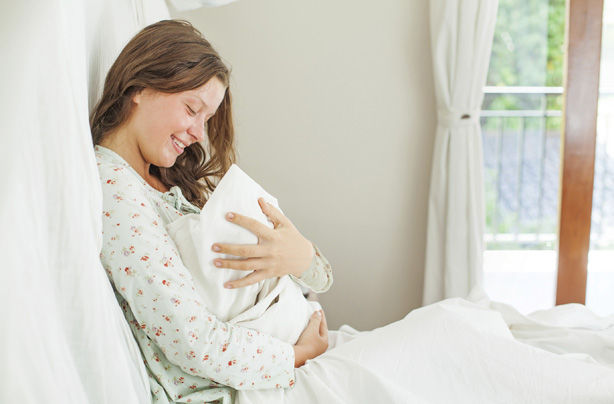Vaginal seeding: The controversial new birthing practice all expectant mums should know about
It's dividing opinions in the birthing community.

Hot on the heels of the placenta-eating trend, there's a new controversial birthing practice that all expectant mums should be aware of: vaginal seeding.
The process, which is also known as micro-birthing, is dividing opinions in the health industry, with some experts backing the idea, while others state that further evidence is needed.
In fact, recent research in the British Medical Journal warned that new mothers could be putting their babies at risk by performing vaginal seeding, particularly with group B strep (GBS), which is a serious infection that can lead to death. Around a quarter of pregnant women carry GBS at any one time, with a small number of babies becoming infected during birth.
Considering vaginal seeding for you and your child? Here's what you need to know:
What is vaginal seeding?
Vaginal seeding is a practice where mothers who give birth to their children through caesarean section take swabs of their vaginal fluid to rub on the face, body and inside the mouth of their newborn.
It may sound extreme, but babies who are born naturally come into contact with around 300 different bacteria - something those born through c-sections don't experience. Those who believe in vaginal seeding say that creating contact with the microbes that a baby would have had exposure to through a vaginal birth can help to bolster the immune system in the same way.
Research has shown that compared to vaginally-born babies, children who are born via C-section are more likely to suffer from health problems including asthma, allergies, eczema, type 1 diabetes and celiac disease, as well as more likely to be hospitalised for gastroenteritis.
GoodtoKnow Newsletter
Parenting advice, hot topics, best buys and family finance tips delivered straight to your inbox.
If vaginal seeding is as effective as supporters say, it may also help to protect them against these illnesses.
Dr Maria Gloria Dominguez-Bello, the Associate Professor in Medicine at New York University, told Body and Soul magazine that although the technique is not perfect, it can have some benefit for the child, particularly with regards to immunity.

'We can't restore [the vaginal microbes] 100 per cent, which isn't surprising when you consider how long a baby is exposed to the vaginal microbes during labour, but there might be a window very early on after birth when we can help balance the immune system,' she explained.
'We can't yet imply anything about improving the baby's health in terms of its risk of disease though… in order to prove that, we need to conduct a study of 1200 babies, and that's something we're working towards.'
Another small study conducted at the University of Puerto Rico aimed to prove the benefits of the process, but was deemed by many experts to be inconclusive.
Further research is needed to prove the benefits of seeding for certain, but if you are considering it for you and your baby, you need to be aware of the safety precautions. As the BMJ mentions, there may be risk of spreading infection, so you should be tested beforehand for any harmful bacteria or STDs. Some medical professionals will assist you as part of your birthing plan, while others may decline; it is down to personal discretion.
'Doctors, nurses, midwives and parents need to be aware they are doing something with a potential risk that currently doesn’t have any evidence of benefit,' Dr Aubrey Cunnington explains in the BMJ article on the subject.
The article also states: 'Parents should be advised to mention that they performed vaginal seeding if their baby becomes unwell, because this may influence a clinician’s assessment of the risk of serious infection.'
'Health professionals should be aware that vaginal seeding is increasingly common and ask about it when assessing neonates who may have an infection.'
Trusted, informative, and empathetic – GoodToKnow is the ultimate online destination for parents. At GoodtoKnow, our mission is 'simple': we're trying to make sense of parenthood. On the site, you'll find everything you need for a happy, healthy family life. Our huge archive of content includes more than 18,000 articles and 1,500 how-to videos. These include expert-backed advice features on parenting, dealing with relationship changes after having a baby, self-care for mums and managing your family finances. We also feature tried-and-tested product reviews and buying recommendations for every stage of family life - from prams and Moses baskets to birthday gifts and top toys.